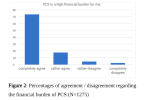Financial burden of patients with post-acute COVID-19 syndrome
Jennifer Scheel-Barteit, Caroline Floto, Henrike Höpfner, Thomas Kühlein, Bettina Hohberger, Maria Sebastião
[Line breaks added]
Aim
The present study aimed to analyze the financial burden of German patients with Post‐acute COVID‐19 syndrome (PCS) and its predictors exploratively. Information regarding the financial burden of PCS patients and its predictors is of vital importance to identify patients at high risk and address the support needed by this patient group.
Subject and methods
As no established diagnostic process or therapy exists, many PCS patients are dissatisfied with standard health care and engage in out-of-pocket payments (OOPPs) for diagnostics and therapy. This is particularly problematic as they often experience a simultaneous change of employment status and loss of income. In the present cross-sectional study, data on financial burden (changes in employment status, loss of income, OOPPs) were assessed via a self-report online questionnaire.
Results
PCS is a high subjective financial burden for 91.0% of the participants. About 80% of the PCS patients reported high financial losses due to loss of income and high costs due to OOPPs. A wide spectrum of conventional and complementary / alternative diagnostic and therapeutic procedures was reported.
The most frequent type of OOPP diagnostics were vitamin level tests (56.2%), antibody detection (43.8%), and trace element level tests (42.4%). The most frequent type of OOPP therapies were dietary supplements (67.1%), osteopathy (30.1%), physiotherapy / physical therapy (28.2%), relaxation techniques (24.2%), and acupuncture (20.7%).
In regression analyses, change of employment status was predicted by income, type of health care insurance, subjective impairments in day-to-day-life, physician contacts, Post-COVID-Clinic, and contact with a support group. High loss of income was predicted by sex, higher education, change of employment status, income, type of health care insurance, subjective impairments in day-to-day-life, and physician contacts.
High OOPPs were predicted by education, health status pre PCS, subjective impairments in day-to-day-life, physician contacts, contact to alternative / complementary practitioners, and contact to a support group.
Conclusions
PCS patients in Germany suffer from a high financial double burden of loss of income and additional costs due to OOPP diagnostics and therapies. Until effective PCS therapies are implemented in standard care, patients should receive medical information and counseling. Also, the public should be informed regarding non-effective PCS therapies.
Web | PDF | Journal of Public Health | Open Access
Jennifer Scheel-Barteit, Caroline Floto, Henrike Höpfner, Thomas Kühlein, Bettina Hohberger, Maria Sebastião
[Line breaks added]
Aim
The present study aimed to analyze the financial burden of German patients with Post‐acute COVID‐19 syndrome (PCS) and its predictors exploratively. Information regarding the financial burden of PCS patients and its predictors is of vital importance to identify patients at high risk and address the support needed by this patient group.
Subject and methods
As no established diagnostic process or therapy exists, many PCS patients are dissatisfied with standard health care and engage in out-of-pocket payments (OOPPs) for diagnostics and therapy. This is particularly problematic as they often experience a simultaneous change of employment status and loss of income. In the present cross-sectional study, data on financial burden (changes in employment status, loss of income, OOPPs) were assessed via a self-report online questionnaire.
Results
PCS is a high subjective financial burden for 91.0% of the participants. About 80% of the PCS patients reported high financial losses due to loss of income and high costs due to OOPPs. A wide spectrum of conventional and complementary / alternative diagnostic and therapeutic procedures was reported.
The most frequent type of OOPP diagnostics were vitamin level tests (56.2%), antibody detection (43.8%), and trace element level tests (42.4%). The most frequent type of OOPP therapies were dietary supplements (67.1%), osteopathy (30.1%), physiotherapy / physical therapy (28.2%), relaxation techniques (24.2%), and acupuncture (20.7%).
In regression analyses, change of employment status was predicted by income, type of health care insurance, subjective impairments in day-to-day-life, physician contacts, Post-COVID-Clinic, and contact with a support group. High loss of income was predicted by sex, higher education, change of employment status, income, type of health care insurance, subjective impairments in day-to-day-life, and physician contacts.
High OOPPs were predicted by education, health status pre PCS, subjective impairments in day-to-day-life, physician contacts, contact to alternative / complementary practitioners, and contact to a support group.
Conclusions
PCS patients in Germany suffer from a high financial double burden of loss of income and additional costs due to OOPP diagnostics and therapies. Until effective PCS therapies are implemented in standard care, patients should receive medical information and counseling. Also, the public should be informed regarding non-effective PCS therapies.
Web | PDF | Journal of Public Health | Open Access

